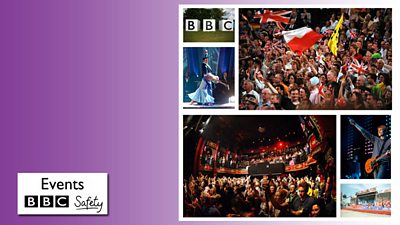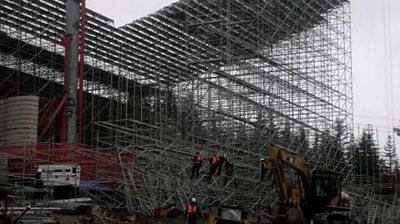Running an Event can be a difficult and complex task which can be influenced by a multitude of factors. Whether it’s a small scale or a major event, the process followed to plan and manage the event will directly influence how well the H&S issues are managed and ultimately how successful it will be.
Appropriate planning & management of an event is a Legal Requirement and in cases of serious incidents it could have major consequences for the Event Organisers / Partners.
What Can Go Wrong?
- Lack of appropriate & competent event team members / event management company.
- Lack of information from event partners.
- No clarity on who is doing what and suitable plans not developed.
- Event planning tasks start to overwhelm the event team close to the event date.
- Event license refused and event cannot take place.
- Major or serious incident occurs directly linked to lack of planning.
Legal/������̳ Requirements
- All entertainment events are classed as work activities and are therefore subject to the HSW Act and various regulations and Codes of Practice. In addition, licensing legislation may also apply. Event organisers, concert promoters, licensees, specialist contractors and venue owners all have a statutory duty to protect the health and safety of their workers and others who may be affected by their work activity.
- In addition the Management of Health and Safety at Work Regulations 1999 require employers to assess the risks which might exist in the workplace and might affect employees or non-employees (members of the public). They also require them to decide whether safety precautions are adequate and, if they are not, what other control might be needed.
- The Construction Design and Management Regulations (CDM 2015) applies to the use of any temporary and demountable structures for example Marquees, Stages, & Seating.
- The Purple Guide to Health, Safety and Welfare at Music and Other Events (new version released March 2014), explains the legal aspects in more detail.
Control Measures
General Controls
- At the very beginning of the Event, whilst it’s still an idea, think about developing a Business Plan for the Event. This will help you organise your thoughts, share them with others on paper before putting plans into action.
Event Business Plan
- Key areas to be addressed in an Event Business Plan include:
- The event’s vision and mission – i.e. what it ultimately aims to achieve
- Who the key stakeholders are
- The relevant experience and track record of the organisers
- The event’s background and an overview of plans
- The audience/spectator/participant profile
- A development plan – key aims and objectives going forward
- Marketing and communications planning
- Allocation of CDM 2015 responsibilities
- Event requirements – staffing structure, facilities, services, venues, etc
- How much the event will cost – budget projections
- How will it be paid for – identifying income streams
- Management and business controls
- Risk management and contingency plans
- Future considerations
- This business plan naturally extends to the development of an Event Action Plan which will be a live management tool that details key event milestones and activity against a timeline.
Event Action Plan
- This action plan will vary depending on the type of event but should cover issues such as:
- Identifying event partners and contributors
- Allocating managerial responsibilities
- Licensing, legal or insurance issues
- Key meetings – i.e. steering group or sub-committee meetings
- Emergency and contingency planning
- Venue specific activities
- Programme specific activities
- Pre-production/production milestones
- Event build (including CDM plan)
- Live event
- Event ‘take-down’ or ‘de-rig’ (including CDM plan)
- Post Event evaluation & reporting
- Use the Event Responsibilities page and the Event Location checklists to help you identify what elements are relevant to your event, who is doing it, what is it that they will do & by when.
- Any such Event Action Plan needs to be actively monitored and updated and any key inter dependencies should be suitably reviewed as the plan progresses.
Event Team
- Having the right team with the relevant skills will be essential to the successful delivery of the Event.
- Having people & engaging contractors, with the right skill set and competencies will not only enable things to run smoothly, but their ideas and input could greatly enhance your event.
- The process of putting the team together starts with drawing up job descriptions for the various roles you wish to create. These should state simply and clearly what you expect each person to do. This should help you clarify the actual roles you need to put in place and the skill sets required.
Decision about whether to Engage an External Event Organising Company
- The key to running a successful event is having the right creative content and then having the infrastructure and the logistics to be able to deliver that. Whilst the ������̳ certainly specialises in the creative content department, depending on the type and complexity of the event, it may not have the experience and expertise to manage the infrastructure and logistics elements.
- The key questions to ask when trying to establish if an external event organising company should be engaged is:
- Does the ������̳ department / individuals have demonstrable experience and competency in successfully running events of a similar size and complexity?
- Do not be over optimistic on the capability side for budgetary reasons.
- Be fully confident to justify the reasons for the choice should something subsequently go wrong at the event.
- If an external event organising company is to be engaged a similar logic must be applied to judge their suitability.
Learning from Past Experience
- Have we done a similar event recently? Whilst no two events will be identical, however, the likelihood is that we may have done something similar.It is enormously helpful to be able to speak to the individuals involved and get an insight into their event which you can apply to yours.
- Most events, that have a degree of complexity, will usually have an Event Management Plan (EMP). A well structured and developed EMP will effectively tell a lay person how that particular event is being run, right from the initial concept, build, show and then through to the eventual strike and clean up.
- At the concept stage of the event, speak to your Safety Adviser, they may be able to supply a EMP for a similar event which could be used as a template to develop for your own event.
What documents do I need to demonstrate effective H&S management for my event?
- This is very much dependent on the type and complexity of the event.
- For a simple straight forward event a standard risk assessment which addresses the event specific issues will be adequate.
- For more complex event, in addition to the Risk Assessments, you may have to develop a Event Management Plan and have an overall Event Safety File. At the concept stage of the event, speak to your Safety Adviser, they will be able to advise & guide you.
Division Specific Issues
- No division specific issues
FAQs/Did You Know?
- The Purple Guide to Health, Safety and Welfare at Music and Other Events (new version released March 2014) aims to help everyone who organises music events so that events run safely. The guide will enable event organisers to understand the needs of others concerned with the event, such as local authorities and the emergency services, so that they can all work together to improve event safety.
- The National Arenas Association (NAA) Safety Advisory Group, have produced a guide that aims to simplify health, safety and operational issues for event promoters. The A-Guide provides guidance for production-type events. It defines consistent health, safety and operational standards for event planning and management in NAA member venues and represents compliance with UK law, relevant guidance and best practice. The link is in our Recommended Links.
Useful documents
Recommended links
-
[Gateway]
-
-
(Contact ������̳ Safety for access)
-
-
-
Events Safety Guide
-

Events Safety Guide
Visit the Events Safety Guide for a collection of topics related to organising your event.
More from SSR
-
Your platform to record accidents, risk assessments, assurance monitoring and inspections
-
Safety Equipment Stores
Just one number to call: 020 3614 5155 -
������̳ Safety Guidelines
An A-Z of ������̳'s Health and Safety Guidelines -
Safety Advice Line: 0370 411 0464 Email: safety@bbc.co.uk
- A-Z of ������̳ Safety Guidelines
- Accident Reporting and Investigation
- ������̳ Health & Safety Policy
- Contractors (incl. vetted lists)
- Contributors
- Fire Safety
- Freelancers
- Independent Production Companies
- Risk Assessment
- Safety Alerts
- Safety Responsibilities
- Safety Training
- Sets & Premises Safety Guide
Events guidance - key links:
- Exhibitions
- General Guidance
- Indoor Location Recce Checklist
- Outdoor Location Recce Checklist
- Major Incidents & Emergency Planning
- Marketing and Promotional
- Noise Exposure
- Planning and Management
- Responsibilities
- Responsibilities Form
- Laser Lighting Effects
- Strobe Lighting
- Temporary Stages and Rostra
Health topics - key links:
- (������̳ network only)
- Contributors Fitness to Participate
- Display Screen Equipment (DSE)
- (������̳ network only)
- First Aid and Welfare on Location
- International Travel - Risks & Health
- Manual Handling
- Mental Health: Homepage
- (������̳ network only)
- Personal Health and Wellbeing
- Pregnancy
- Psychological Trauma Support & Trauma Risk Management (TRiM)
- Tiredness and Fatigue
- Travel Health Contacts
������̳ High Risk - key links:
- CBRN and Industrial Spills
- Covert Filming
- Crisis Management and Security Support
- Demonstrations, Protests and Crowds
- Disaster Coverage
- Door Stepping
- (������̳ network only)
- (������̳ network only)
- Public Order
- Safety Equipment Stores
������̳ Journalism - key links:
������̳ Productions - key links:
- Aerial Filming and Airfields
- Animals: Displaying and handling for performance
- Boats: Working on
- Children and Young People
- Driving
- Electrical Equipment and Systems
- First Aid and Welfare on Location
- Food Safety (Cooking and Catering)
- Remote Location Working
- Roads and Streets: Working by
- Security of Productions on Location
- Stunts
- Tiredness and Fatigue
- Unmanned Aerial Systems (UAS aka Drones)
- Vehicles: Recording in, from and around
- Working at Height: Mobile Elevating Work Platforms
- Working at Height: Tower Scaffolds
������̳ Radio - key links:
- (������̳ Network only)
������̳ Security - key links:
������̳ Sport - key links:
About this site
This site describes what the ������̳ does in relation to managing its health, safety and security risks and is intended for those who work directly for the ������̳.
It is not intended to provide instruction or guidance on how third parties should manage their risks. The ������̳ cannot be held liable for how this information is interpreted or used by third parties, nor provide any assurance that adopting it would provide any measure of legal compliance. More information
Some links on this site are only accessible when connected to the ������̳ network
